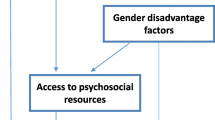Abstract
Background
It is not known if adolescents from diverse groups of Black African origin experience similar or different psychological well-being.
Aims
To examine adolescent self-report of psychological well-being among Black African and White UK origin groups and to assess the extent to which family type and social deprivation influence any ethnic differences.
Method
The 25-item Strengths and Difficulties Questionnaire (SDQ) was used to assess psychological well-being in a study of 6,632 11–13 year-olds in 51 schools in London.
Results
Overall, family type (but not material deprivation) was an important independent correlate of psychological well-being. Nigerian/Ghanaian boys reported the lowest mean Total Difficulties Score (TDS) compared to White boys (regression coefficient (95% CI) −2.09 (−2.83, −1.35) p < 0.001). They also had significantly higher mean pro-social behaviour score, and were at reduced risk of a high (i.e., likely psychological distress) TDS score. TDS was also significantly lower than Whites for Other African boys and girls. Other African and Mixed ethnicities were protective factors against risk of psychological distress for girls.
Conclusions
Black African boys and Other African boys and girls reported the most favourable psychological well-being scores. The influence of family type on mental health may operate differently for girls compared to boys and for Africans compared to other ethnic groups.
Similar content being viewed by others
References
Acheson D (1998) Independent inquiry into inequalities in health. The Stationery Office, London
British Medical Association (2006) Child and adolescent mental health a guide for healthcare professionals. BMA, London
Asthana S, Halliday J (2006) What works in tackling health inequalities? Pathways, policies and practice through the lifecourse. The Policy Press, Bristol
Office for National Statistics (2004) Focus on ethnicity and identity. HMSO, London
Stansfeld S, Haines M, Head J, et al. (2004) Ethnicity, social deprivation and psychological distress in adolescents. School based epidemiological study in east London. Br J Psychiatry 185:233–238
Inspection reports. Manchester: Ofsted – Office for Standards in Education. http://www.ofsted.gov.uk
Harding S, Whitrow M, Maynard MJ, et al. (in press) Cohort Profile. The DASH (Determinants of Adolescent Social well-being and Health) Study: an ethnically diverse cohort. Int J Epidemiol
Goodman R (1997) The strengths and difficulties questionnaire: a research note. J Child Psychol Psychiatry 38:581–586
Meltzer H, Gatward R, Goodman R, et al. (2000) Mental health of children and adolescents in Great Britain. The Stationery Office, London
Quilgars D (2002) The mental health of children. In: Bradshaw J (ed) The well-being of children in the UK, Save the Children, London
Green H, McGinnity A, Meltzer H, et al. (2005) Mental health of children and young people in Great Britain, 2004. Palgrave MacMillan, Basingstoke
Millar J, Ridge T (2001) Families, poverty, work and care: a review of the literature on lone parents and low income couple families. Department for Work and Pensions Research report No. 153. CDS: Leeds
Prescott-Clarke P, Primatesta P (1998) Health survey for England 97, the Health of Young People ’95–97. The Stationery Office, London
Goulbourne H, Chamberlain M (2001) Caribbean families in the Trans-Atlantic world. In: Goulbourne H, Chamberlain M (eds) Caribbean families in Britain and the trans-Atlantic world. Macmillan Education Ltd., London
Karvonen S, West P, Sweeting H, et al. (2001) Lifestyle, social class and health-related behaviour: a cross-cultural comparison of 15 year olds in Glasgow and Helsinki. J Youth Stud 4:393–414
West P (1997) Health inequalities in the early years: is there equalisation in youth? Soc Sci Med 44:833–858
Sweeting H (2000) What’s most important for teenage health? The patterning of health and behaviours according to social position and social life. In: Ryan H, Bull J (eds) Changing families, changing communities: researching health and well being among children and young people. Health Development Agency, London
West P, Sweeting H (2003) Fifteen, female and stressed: changing patterns of psychological distress over time. J Child Psychol Psychiatry 44:399–411
Glendinning A, Kloep Mand Hendry LB (2000) Parenting practices and wellbeing in youth: family life in rural Scotland and Sweden. In: Ryan H, Bull J (eds) Changing families, changing communities: researching health and wellbeing among children and young people. Health Development Agency, London
Hylton C (1997) Moyenda: black families talking – family survival strategies. Exploring Parenthood, London
Reynolds T (2001) Caribbean fathers in family lives in Britain. In: Goulbourne H, Chamberlain M (eds) Caribbean families in Britain and the transatlantic world, Macmillan, London
Harding S, Balarajan R (2001) Longitudinal study of socio-economic differences in mortality among South Asian and West Indian migrants. Ethn Dis 6:121–128
Nazroo JY (1997) The health of Britain’s minorities. Policy Studies Institute, London
Goodman R, Ford T, Simmons H, et al. (2000) Using the Strengths and Difficulties Questionnaire (SDQ) to screen for child psychiatric disorders in a community sample. Br J Psychiatry 177(6):534–539
Acknowledgements
The study is funded by the Medical Research Council. We are grateful for the support of the community figures, schools, parents and students involved in the study. We also thank the fieldwork team involved in the data collection.
Author information
Authors and Affiliations
Corresponding author
Rights and permissions
About this article
Cite this article
Maynard, M.J., Harding, S. & Minnis, H. Psychological well-being in Black Caribbean, Black African, and White adolescents in the UK Medical Research Council DASH study. Soc Psychiat Epidemiol 42, 759–769 (2007). https://doi.org/10.1007/s00127-007-0227-7
Received:
Accepted:
Published:
Issue Date:
DOI: https://doi.org/10.1007/s00127-007-0227-7




